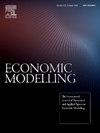Does digital finance spatial correlation drive income convergence?
IF 4.7
2区 经济学
Q1 ECONOMICS
引用次数: 0
Abstract
Digital finance significantly boosts household incomes and reduces regional disparities. Although digital finance can narrow income inequality, the spatial impact of digital finance on income convergence remains inadequately examined. This study evaluates whether and how the spatial correlation with central digital finance regions promotes income convergence, by employing a modified gravity model and data from Zhejiang Province in China. The empirical evidence shows that digital finance spatial correlation can contribute to income growth. Notably, low-income regions derive a stronger growth impetus by enhancing spatial correlation with central digital finance regions, narrowing the income inequality with high-income regions. Specifically, capital flow, technological innovation, and business creation are three effective mechanisms. Heterogeneity analysis demonstrates that the convergence effect is particularly significant for regions with mountains and without high-speed rail (HSR) stations, underscoring the spatial penetration capabilities of digital finance. Governments should encourage more cross-regional digital finance cooperation to achieve balanced regional development.
数字金融空间关联驱动收入趋同吗?
数字金融显著提高了家庭收入,缩小了地区差距。虽然数字金融可以缩小收入不平等,但数字金融对收入趋同的空间影响仍未得到充分研究。本文采用修正的重力模型和浙江省数据,评估了中央数字金融区域的空间相关性是否以及如何促进收入趋同。实证表明,数字金融空间相关性对收入增长有促进作用。值得注意的是,低收入地区通过增强与中央数字金融区域的空间相关性,缩小与高收入地区的收入差距,获得更强的增长动力。具体来说,资本流动、技术创新和企业创造是三个有效的机制。异质性分析表明,在山区和无高铁站点的地区,收敛效应尤为显著,凸显了数字金融的空间渗透能力。各国政府应鼓励开展更多跨区域数字金融合作,实现区域均衡发展。
本文章由计算机程序翻译,如有差异,请以英文原文为准。
求助全文
约1分钟内获得全文
求助全文
来源期刊

Economic Modelling
ECONOMICS-
CiteScore
8.00
自引率
10.60%
发文量
295
期刊介绍:
Economic Modelling fills a major gap in the economics literature, providing a single source of both theoretical and applied papers on economic modelling. The journal prime objective is to provide an international review of the state-of-the-art in economic modelling. Economic Modelling publishes the complete versions of many large-scale models of industrially advanced economies which have been developed for policy analysis. Examples are the Bank of England Model and the US Federal Reserve Board Model which had hitherto been unpublished. As individual models are revised and updated, the journal publishes subsequent papers dealing with these revisions, so keeping its readers as up to date as possible.
 求助内容:
求助内容: 应助结果提醒方式:
应助结果提醒方式:


